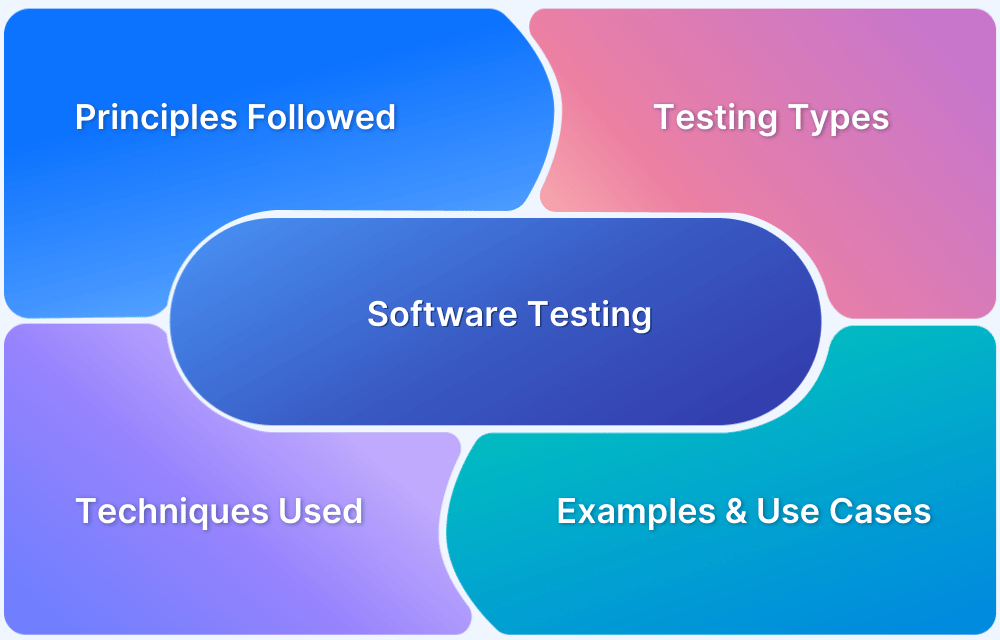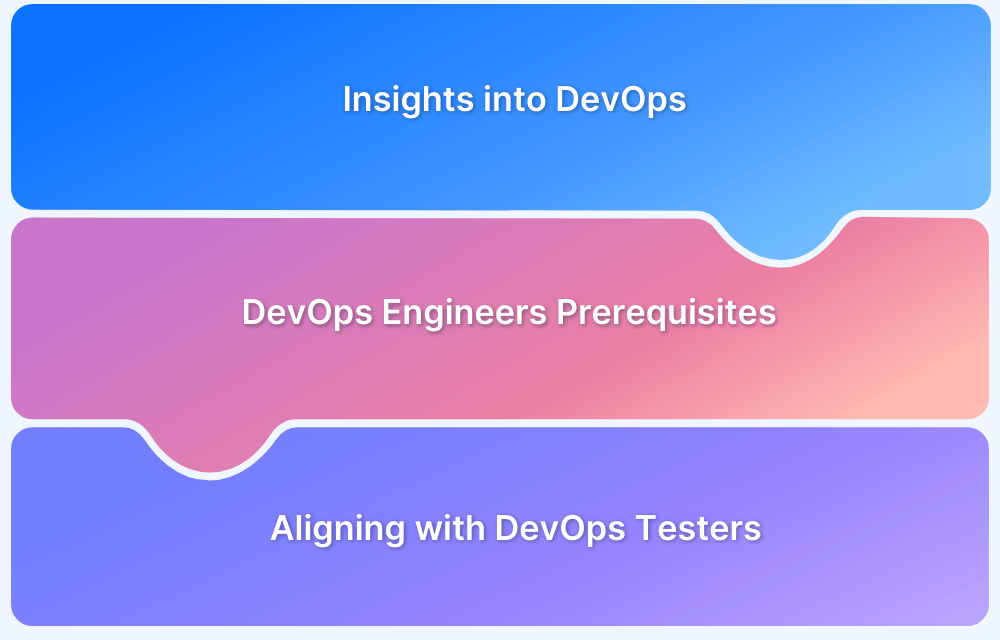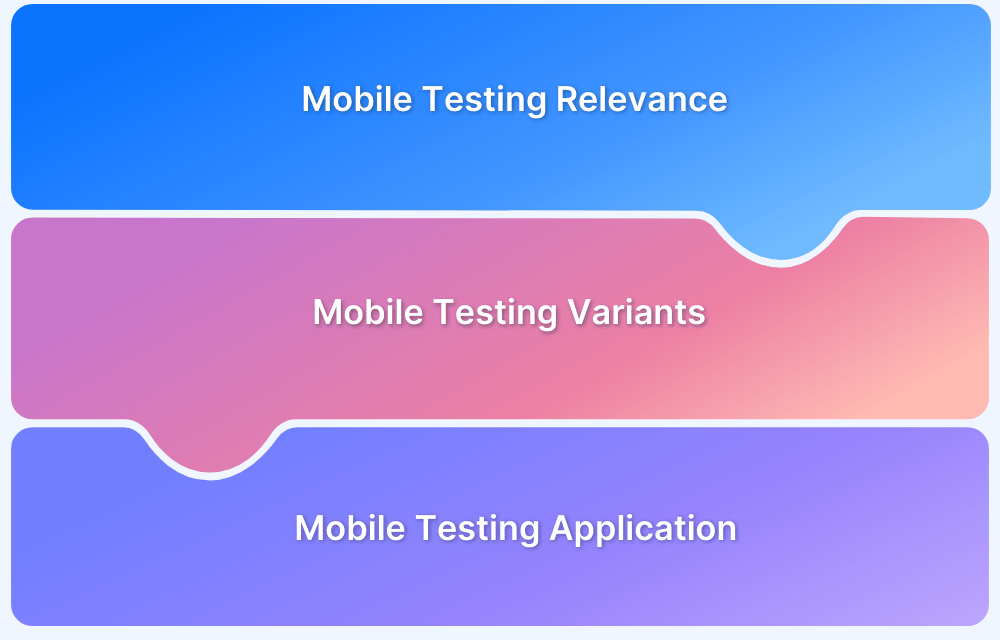The software engineering field is vast, with different roles based on the complexity of the application. Accordingly, engineering functions have different types of software engineers in their teams. Some of the most popular types of software engineering roles are:
Overview
Types of Software Engineering Roles
- Front-End Engineer
- Back-End Engineer
- Full Stack Engineer
- Software Engineer in Test (QA Engineer)
- Software Development Engineer in Test (SDET)
- DevOps Engineer
- Security Engineer
- Data Engineer
- Cloud Architect
- Systems Engineer
- Mobile Engineer
- Technical Support Engineer
- Game Developer
- Machine Learning (ML) Engineer
- Artificial Intelligence (AI) Engineers
- Blockchain Engineers
- Embedded Systems Engineers
- Web Application Security Engineers (WASE)
- Site Reliability Engineers (SREs)
- User Experience (UX) Engineers
- User Interface (UI) Engineers
- Robotics Engineers
- Internet of Things (IoT) Engineers
- Software Integration Engineer
In this guide, you will explore each type of software engineering role in detail.
What is Software Engineering?
Software Engineering refers to applying engineering principles to the design, development, testing, deployment, and maintenance of software systems. This process ensures that efficient, scalable software that meets user requirements and business goals is developed.
Scope of Software Engineering
Software engineering has a vast scope, and it continues to grow. Here’s a quick run-through:
- Vast Industry Applications: Software is an integral part of almost all industries today, ranging from healthcare and finance to entertainment and transportation.
- Numerous Specializations: The software engineering field comes with numerous specializations like front-end development, back-end engineering, QA & testing, DevOps, Data engineering and many more.
- Innovation & R&D: Software engineering helps develop cutting-edge technologies like AI, blockchain, IoT, robotics, and virtual reality.
- Career opportunities: It has a high demand across the world be it for startups, tech giants, government, and consulting sectors. The roles range from developers to CTOs.
- World-wide Impact: The influence of software engineering is growing on a global scale, creating an impact on various spheres like education, social media etc.
- Evolving Tools and Practices: The field is continuously evolving, especially in areas like Agile, DevOps, and many frameworks.
24 Different Types of Software Engineering Roles in 2025
The software engineering field is vast, with different roles based on the complexity of the application. Accordingly, engineering functions have different types of software engineers in their teams. Some of the most popular types of software engineer roles are:
1. Front-End Engineer
A software engineer who specializes in the development of the user interface (UI) is called a front-end engineer. The user interfaces include visual elements like layouts and aesthetics. Front-end engineers deal with cross browser compatibility and fixing bugs to ensure an excellent visual presentation of the UI. Thus, they work with the code that runs on different user devices, browsers, and operating systems. Developing a responsive application also comes under this.
Skills of a Front-End Engineer
- Proficiency in HTML, CSS, and JavaScript
- Experience with front-end frameworks and libraries like React, Angular, Vue.js, and jQuery.
- Understanding of responsive design
- Knowledge of browser compatibility issues
- Familiarity with version control systems
- Ability to work with APIs
- Good communication and collaboration skills
Estimated Salary Range: $65,000 – $107,000
2. Back-End Engineer
A software engineer who specializes in the underlying logic and performance of the application is called a back-end engineer. They often design and implement the core logic, keeping in mind scalability. They do this by integrating with data systems, caches, email systems using Application Programming Interfaces (APIs).
Skills of a Back-End Engineer
- Proficiency in one or more programming languages like Java, Python, PHP, Ruby, or Node.js
- Understanding of web development frameworks like Spring, Django, Laravel, or Ruby on Rails.
- Experience with databases such as MySQL, PostgreSQL, MongoDB, or Cassandra.
- Knowledge of server and network architecture
- Familiarity with RESTful APIs
- Good debugging and problem-solving skills
- Good communication and collaboration skills
Estimated Salary Range: $115,000 – $140,000
3. Full Stack Engineer
A software engineer who can handle both front-end and back-end work is called a full-stack engineer. They have the skills required to create a fully functional web application.
Skills of a Full-Stack Engineer
- Proficiency in one or more programming languages like Java, Python, PHP, Ruby, or Node.js
- Experience with front-end frameworks and libraries like React, Angular, Vue.js, and jQuery.
- Understanding of web development frameworks like Spring, Django, Laravel, or Ruby on Rails.
- Familiarity with databases such as MySQL, PostgreSQL, MongoDB, or Cassandra.
- Knowledge of server and network architecture
- Ability to work with APIs
- Good debugging and problem-solving skills
- Good communication and collaboration skills
Estimated Salary Range: $117,000 – $223,000
4. Software Engineer in Test (QA Engineer)
A software engineer who is responsible for writing software to validate the quality of the application is called a QA engineer. QA engineers create test plans, manual tests, automated tests using tools and frameworks to make sure that products and processes run as expected. They create test summary report, bug reports, and take care of defect management to ensure that the end user gets a seamless user experience.
Skills of a Software Engineer in Test (QA Engineer)
- Proficiency in one or more programming languages like Java, Python, PHP, Ruby, or Node.js to develop test automation scripts
- Understanding of different types of testing such as Unit Testing, Functional Testing, Cross Browser Testing, UI Testing, etc.
- Knowledge of testing frameworks such as JUnit, TestNG, or PyTest to design and execute test cases
- Experience with one or more automation Testing Tools and Libraries such as Selenium, Appium, Cypress, Playwright, Puppeteer, WebdriverIO, NightwatchJS, Espresso, XCUITest, Cucumber, etc.
- Knowledge of Tools like BrowserStack Live, App Live, Automate, App Automate, Percy, App Percy, etc.
- Understanding of software development processes such as Agile and Scrum.
- Familiarity of Databases to create Database Tests
- Knowledge of continuous integration and delivery tools like Jenkins, Bamboo, Travis CI, CircleCI, etc.
- Strong analytical and problem-solving skills
- Good documentation, communication and collaboration skills
Estimated Salary Range: $114,000 – $183,000
Read More: Top 10 Skills of a Proficient QA Manager
Pro-Tip: Learn the Skills of Testing with BrowserStack’s Test University online. Test University offers 40+ courses that can help you hone your testing skills. The courses are completely free of cost and are comprised of interactive video tutorials, lab exercises relevant to common testing scenarios, etc.
5. Software Development Engineer in Test (SDET)
While SDET if often confused with the QA Engineer or Software Engineer in Test, and sometimes even used interchangeably, SDET is an overlap of Development and Testing. SDETs are developers who are well-equipped with testing skills and are responsible for testing along with Development.
Skills of a Software Development Engineer in Test (SDET)
The Skills of SDET are similar to Software Engineer in Test (QA), however, SDET should be more proficient in Automation Frameworks and have a strong hold on the programming languages.
Estimated Salary Range: Starts from $95,701
6. DevOps Engineer
Software engineers who are familiar with the technologies required for the development of systems to build, deploy, integrate and administer back-end software and distributed systems are called DevOps engineers. They mostly manage the application infrastructure, i.e., the database systems, servers, etc.
Skills of a DevOps Engineer
- Proficiency in scripting languages such as Bash, Python, or Ruby
- Experience with automation tools such as Chef, Puppet, Ansible, or Terraform
- Familiarity with cloud platforms such as Amazon Web Services (AWS), Microsoft Azure, or Google Cloud Platform (GCP).
- Understanding of containerization technologies such as Docker or Kubernetes
- Knowledge of continuous integration and delivery tools like Jenkins, Bamboo, Travis CI, CircleCI, etc.
- Familiarity with monitoring and logging tools such as Nagios, Prometheus, or ELK
- Strong problem-solving skills
- Good communication and collaboration skills
Estimated Salary Range: $122,761 – $173,590
Read More: DevOps vs CloudOps: How are they Different?
7. Security Engineer
A software engineer who specializes in creating systems, methods, and procedures to test the security of a software system and exploit and fix security flaws is called a security engineer. This type of developer often works as a “white-hat” ethical hacker and attempts to penetrate systems to discover vulnerabilities.
Skills of a Security Engineer
- Strong understanding of information security
- Familiarity with security tools and technologies such as firewalls, intrusion detection and prevention systems (IDS/IPS), security information and event management (SIEM), and vulnerability scanning tools.
- Proficiency in scripting and programming languages such as Python, Perl, or Ruby
- Experience with security compliance frameworks such as PCI-DSS, HIPAA, or ISO 27001
- Familiarity with cloud security services such as AWS Security, Azure Security, or Google Cloud Security
- Understanding of threat modeling and risk assessment
- Strong analytical and problem-solving skills
Estimated Salary Range: $177,000 – $311,000
8. Data Engineer
Data Engineers handle operations like ETL, Data Warehousing, Database management, and Data Mining, to name a few. They help the developer and test engineers with the data infrastructure that is used to ensure the smooth functioning of the application.
Skills of a Data Engineer
- Proficiency in programming languages such as Python, Java, or Scala to develop and maintain data pipelines, ETL processes, and data models.
- Experience with big data technologies such as Hadoop, Spark, or Kafka
- Familiarity with data warehousing technologies such as Snowflake, Redshift, or BigQuery
- Knowledge of data modeling and database design
- Understanding of data governance and security
- Proficiency in SQL
- Familiarity with cloud platforms such as AWS, Azure, or Google Cloud Platform
- Strong problem-solving skills
Estimated Salary Range: $80,000 – $156,000
9. Cloud Architect
With the applications and platforms moving into the cloud servers, Cloud Architects play a pivotal role in managing the cloud-based infrastructure and its operations. From Cloud Management and Migration to Monitoring, Cloud Architects take care of everything.
Skills of a Cloud Architect
- Strong understanding of cloud computing
- Proficiency in cloud platforms such as AWS, Azure, or Google Cloud Platform
- Knowledge of cloud security
- Familiarity with cloud-native technologies such as containers, microservices, and serverless computing
- Strong infrastructure and network design skills
- Understanding of compliance and regulatory requirements such as HIPAA, GDPR, or PCI-DSS
- Experience with cloud migration and hybrid cloud
Estimated Salary Range: $128,418 – $202,584
10. Systems Engineer
A System Engineer focuses on the design, implementation and management of complex software systems, including operating systems and network systems. They ensure that various software components work together seamlessly.
Skills of a Systems Engineer
- Deep Understanding of Systems Design and Architecture.
- Know how to design and structure complex systems, including hardware, software, and network components.
- Expertise in various operating systems such as Windows, Linux, and Unix.
- Knowledge of networking concepts, protocols, and technologies like TCP/IP, DNS, DHCP, VPNs.
- Proficiency in programming languages such as Python, Java, C++ and scripting languages like Bash, PowerShell for automation and configuration.
- Skills in diagnosing and resolving system issues, including hardware failures, software bugs, and network problems.
- Understanding of cybersecurity principles, risk management, and methods to protect systems from threats.
- Experience with tools like Ansible, Puppet, or Chef for automating system configurations.
Estimated Salary Range: $68,000 – $131,000
11. Mobile Engineer
A Mobile Engineer develops applications for mobile devices, focusing on platforms like iOS or Android. They develop new features, functionalities, and interfaces according to project requirements and specifications. Identify and resolve bugs and performance issues to enhance app stability and usability.
work with Swift, Objective-C, Kotlin, or Java, and may use cross-platform frameworks like Flutter or React Native.
Skills of a Mobile Engineer
- Deep understanding of mobile ecosystems like Android and iOS.
- Proficiency in Swift and Objective-C, familiarity with Xcode, and understanding of iOS Human Interface Guidelines.
- Expertise in Kotlin and Java, experience with Android Studio, and knowledge of Android design principles.
- Understanding frameworks like React Native, Flutter, or Xamarin for building apps that run on multiple platforms from a single codebase.
- Ability to integrate third-party APIs and SDKs for added functionality, such as payment gateways, maps, or social media.
- Understanding of mobile design principles to create intuitive, responsive, and user-friendly interfaces.
- Proficiency in mobile testing tools and frameworks for automated and manual testing, such as XCTest for iOS and Espresso for Android.
Estimated Salary Range: $80,000 – $150,000
12. Technical Support Engineer
Technical Support Engineer provides support and troubleshooting for software issues. They often work closely with customers or internal teams to resolve technical problems and ensure software functionality.
Skills of a Technical Support Engineer
- Ability to diagnose and resolve technical issues related to hardware, software, and network problems.
- Proficiency in understanding and working with operating systems (Windows, macOS, Linux), software applications, and networking concepts.
- Proficiency in using remote support tools and software (e.g., TeamViewer, Remote Desktop) to diagnose and resolve issues remotely.
- Familiarity with commonly used software applications, databases, and tools specific to the organization.
- Ability to create, maintain, and review technical documentation, including user manuals, knowledge base articles, and troubleshooting guides.
- Flexibility in adapting to new tools, technologies, and changing user requirements.
- Experience with support ticketing systems and customer relationship management (CRM) tools.
- Strong focus on resolving issues in a way that meets the user’s needs and expectations.
- Ability to explain technical concepts in simple terms to non-technical users.
Estimated Salary Range: $94,140 – $116,334
13. Game Developer
A Game Developer is a professional who designs, creates, and develops video games for various platforms such as PC, consoles, mobile devices, and web.
They specialize in creating video games, working on game engines, graphics, and interactive elements. This role involves a combination of technical, creative, and collaborative skills to bring interactive entertainment to life.
Skills of a Game Developer
- Proficiency in languages such as C++, C#, Java, and Python, which are commonly used in game development.
- Familiarity with scripting languages like Lua or Python for game logic and automation.
- Experience with popular game engines such as Unity, Unreal Engine, or Godot. Knowledge of their tools, workflows, and scripting environments.
- Understanding of 3D graphics principles, including rendering techniques, shaders, and graphics APIs (DirectX, OpenGL, Vulkan).
- Skills in animating characters and objects using tools like Blender or Maya, and implementing animations in game engines.
- Knowledge of game design principles, including level design, game mechanics, and user experience (UX) design.
- Knowledge of physics engines and principles for realistic movement, collision detection, and environmental effects.
- Understanding of behavior trees, finite state machines, or other AI techniques for game characters.
- Skills in debugging and optimizing game code to ensure smooth performance and resolve issues.
Estimated Salary Range: $81,219 – $108,471
Read More: How to test Gaming Apps
14. Machine Learning (ML) Engineer
A machine learning engineer designs and implements machine learning models and algorithms. They focus on large data sets, predictive models, and algorithm optimization to deliver the best performance. Data preprocessing, feature selection, model training and performance evaluation are also areas that they work on.
Skills of a Machine Learning Engineer
- Should be proficient in Python, R, or similar programming languages
- Strong know-how of machine learning frameworks (TensorFlow, PyTorch, etc.)
- Knowledge of Data preprocessing and feature engineering
- Should be familiar with model evaluation techniques
- Experience in deep learning, reinforcement learning, and neural networks
Estimated Salary Range: $115,000 – $204,000
Read More: Machine Learning for Automation Testing
15. Artificial Intelligence (AI) Engineer
AI engineering roles specialize in building intelligent systems that can mimic human cognitive functions, such as learning, problem-solving, etc. These engineers focus on developing algorithms for natural language processing, computer vision, etc.
Skills of an AI Engineer
- Should be proficient in Python, Java, or similar programming languages
- Experience with machine learning and deep learning frameworks
- Know-how of neural networks and cognitive systems
- Strong knowledge and understanding of AI algorithms
- Should be familiar with data processing and natural language processing (NLP)
Estimated Salary Range: $134,023 – $145,080
Read More: AI Automation and Testing
16. Blockchain Engineer
A blockchain engineer deals with the design and development of blockchain-based solutions to drive security and transparency of digital transactions. They build decentralized applications (DApps) and implement smart contracts by working with distributed ledger technologies.
Skills of a Blockchain Engineer
- Should be proficient in Solidity, JavaScript, Go, or Python
- Strong knowledge of blockchain platforms like Ethereum, Hyperledger, Bitcoin etc.
- Familiarity with cryptography and consensus algorithms
- Experience in developing decentralized applications (DApps)
Estimated Salary Range: $150,000 – $175,000
17. Embedded Systems Engineer
An embedded systems engineer is responsible for designing and developing software for specialized hardware that is part of an embedded system. They make sure that the software interects seamlessly with the hardware.
Skills of an Embedded Systems Engineer
- Proficiency in C, C++, or assembly language
- Familiarity with microcontrollers and microprocessors
- Know-how of real-time operating systems (RTOS)
- Familiarity with hardware and electronics
- Experience in debugging and testing embedded systems
Estimated Salary Range:$90,000 – $130,000
18. Web Application Security Engineers (WASE)
A web application security engineer ensures the security of web applications by evaluating, testing, and protecting systems from vulnerabilities like cross-site scripting, SQL injection, and other cyber threats.
Skills of a Web Application Security Engineer
- Proficiency in JavaScript, Python, or PHP
- Know-how of web security protocols (HTTPS, SSL/TLS, etc.)
- Should be familiar with security testing tools and penetration testing
- Knowledge of common web vulnerabilities
- Experience with threat modeling and risk assessment
Estimated Salary Range:$120,000 – $160,000
19. Site Reliability Engineers (SREs)
Site reliability engineers work on maintaining and enhancing the system’s availability, reliability, and performance. They focus on automating operational tasks and tracking systems to drive smooth user experiences and minimize downtime.
Skills of a Site Reliability Engineer
- Should be proficient in programming and scripting
- Experience with cloud platforms such as AWS, Google Cloud, Azure
- Know-how of infrastructure automation and orchestration
- Should be familiar with monitoring and incident response tools
- Problem-solving and troubleshooting abilities
Estimated Salary Range:$130,000 – $180,000
20. User Experience (UX) Engineer
UX engineering roles work on enhancing the overall user experience by ensuring that the product is intuitive. UX engineers work with designers and developers to optimize user flows and interaction design.
Skills of a UX Engineer
- Proficiency in design tools like Sketch, Figma, Adobe XD
- Expertise in user research and usability testing
- Design principles and interaction design knowledge
- Understanding of wireframing and prototyping
Estimated Salary Range: $85,000 – $135,000
21. User Interface (UI) Engineer
UI engineers design and develop a product’s UI visual elements. They ensure that the product is visually appealing, blends with the overall design principles, and is user-friendly.
Skills of a UI Engineer
- Should be proficient in HTML, CSS, and JavaScript
- Front-end frameworks and libraries experience
- UI/UX design principles knowledge
- Experience with design tools (Figma, Sketch, Adobe XD)
Estimated Salary Range: $80,000 – $130,000
22. Robotics Engineer
A Robotics engineer develops robotic systems that perform tasks autonomously or semi-autonomously. Hardware and software are integrated to build robots that perform various functions.
Skills of a Robotics Engineer
- Proficiency in programming languages such as C++, Python, ROS
- Mechanical design and electronics knowledge
- Robot kinematics, sensors, and actuators experience
- Knowledge of artificial intelligence and machine learning
- Strong know-how of robotics simulation and modeling tools
Estimated Salary Range: $90,000 – $150,000
23. Internet of Things (IoT) Engineer
IoT Engineer focuses on developing systems that connect the internet and physical devices. They develop hardware and software to communicate with devices and gather data to drive smart devices.
Skills of an IoT Engineer
- Proficiency in programming languages like Python, C, Java
- Experience with IoT platforms like AWS IoT, Azure IoT etc.
- Know-how of embedded systems and sensors
- Cloud computing and data storage knowledge
- Knowledge of IoT protocols (MQTT, CoAP, HTTP)
Estimated Salary Range: $100,000 – $160,000
Read More: What is IoT Software Testing?
24. Software Integration Engineer
These types of engineering roles ensure that multiple software systems integrate and work together smoothly. They develop integration solutions, mitigate compatibility issues and dirves seamless data exchange.
Skills of a Software Integration Engineer
- Proficiency in Java, Python, .NET
- Knowledge of integration frameworks and tools like MuleSoft, Apache Camel
- Familiarity with APIs, RESTful services, and web services
- Understanding of data formats
- Middleware and system architecture experience
Estimated Salary Range: $85,000 – $140,000
Conclusion
Software Engineering is a vast field with different software engineer roles available based on the industry requirements. Some of the types of Software Engineer Roles are mentioned in the article along with the skill set required for each of them.
Many other types of software engineer roles exist in different engineering functions. Ultimately, they all work towards providing a seamless user experience for their application.








